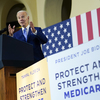[ad_1]

Bottles of prescription supplements go via an automated packaging machine in a pharmacy plant. The Supreme Court docket on Tuesday hears a situation that considers irrespective of whether pharmacies knowingly overcharged Medicare and Medicaid beneath the Fake Promises Act.
Stan Honda/AFP by way of Getty Photographs
hide caption
toggle caption
Stan Honda/AFP by means of Getty Visuals

Bottles of prescription capsules go via an automatic packaging device in a pharmacy plant. The Supreme Court on Tuesday hears a case that considers irrespective of whether pharmacies knowingly overcharged Medicare and Medicaid underneath the False Statements Act.
Stan Honda/AFP through Getty Images
The U.S. Supreme Court will listen to arguments on Tuesday in a circumstance that could undermine just one of the government’s most effective instruments for preventing fraud in governing administration contracts and courses.
The Phony Promises Act dates back to the Civil War, when it was enacted to combat rampant fraud by private contractors who have been overbilling or simply not providing goods to the troops. But the legislation in excess of time was weakened by congressional amendments.
Then, in 1986, Congress toughened the law, and then toughened it yet again. The main Senate sponsor was — and even now is — Iowa Republican Charles Grassley.
“We desired to foresee and block every single avenue that inventive attorneys … may well use to make it possible for a contractor to escape legal responsibility for overcharging,” Grassley said in an interview with NPR.
He is alarmed by the circumstance ahead of the Supreme Court this 7 days. At situation is irrespective of whether hundreds of big retail pharmacies across the nation knowingly overcharged Medicaid and Medicare by overstating what their usual and customary rates had been. If they did, they would be liable for triple damages.
What the pharmacies charged
The scenario in essence started in 2006, when Walmart upended the retail pharmacy entire world by presenting big figures of routinely employed prescription drugs at incredibly affordable price ranges — $4 for a 30-working day source — with automated refills. That still left the relaxation of the retail pharmacy business desperately striving to determine out how to compete.
The pharmacies came up with various offers that matched Walmart’s price ranges for hard cash customers, but they billed Medicaid and Medicare working with far higher price ranges, not what are alleged to be their normal and customary price ranges.
Walmart did report its discounted income price ranges as usual and customary, but other chains did not. Even as the discounted costs grew to become the vast majority of their hard cash sales, other retail pharmacies ongoing to monthly bill the government at the earlier and far better price ranges.
For example, among 2008 and 2012, Safeway billed just $10 for just about all of its cash revenue for a 90-day supply of a top-advertising drug to cut down cholesterol. But it did not report $10 as its typical and customary rate. In its place, Safeway advised Medicare and Medicaid that its usual and customary value ranged from $81 to $109.
How the whistleblowers responded
Performing under the Fake Claims Act, two whistleblowers brought go well with on behalf of the govt alleging that SuperValu and Safeway bilked taxpayers of $200 million.
But the Seventh Circuit Court docket of Appeals ruled that the chains experienced not acted knowingly, even if they “may possibly suspect, think, or intend to file a untrue declare.” And the appeals court even further reported that proof about what the executives realized was “irrelevant” as a matter of law.
The whistleblowers appealed to the Supreme Court docket, joined by the federal government, 33 states and Sen. Grassley.
“It is just opposite to what we meant,” Grassley stated. “That check just can make a hash of the law of fraud.”
The statute is pretty specific, he observes. It states that a particular person or organization knowingly defrauds the govt when it presents a untrue or fraudulent claim for payment. And it defines “knowingly” as: “true knowledge,” “deliberate ignorance” or “reckless disregard of the fact or falsity” of the claim.
“These are 3 distinct mental states,” Grassley claimed, “and it can be any just one of them.”
The companies’ defense
SuperValu and Safeway would not enable their attorneys to be interviewed for this tale, but in their briefs, they argue that a demanding intent requirement is required to keep companies accountable beneath the statute. That is to assure that organizations have honest detect of what is and is not authorized. The companies are backed by a selection of business enterprise pursuits, among the them defense contractors represented by law firm Beth Brinkmann in this scenario.
Brinkmann maintains the False Claims Act is a punitive legislation mainly because it imposes harsh financial penalties for wrongful carry out devoid of crystal clear plenty of company direction. In the long run, she argues, the question is not just one of facts.
“If you will find extra than a single realistic interpretation of the regulation,” Brinkmann reported, “you never know it can be phony.”
Tejinder Singh, representing the whistleblowers, scoffs at that interpretation, contacting it an following-the-point justification for breaking the law.
“It has almost nothing to do with what you feel at the time you acted,” Singh stated, “and has every thing to do with what you make up later on.”
A decision in the circumstance is predicted by summer.
[ad_2]
Source hyperlink




